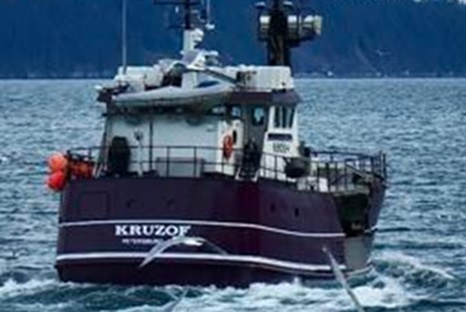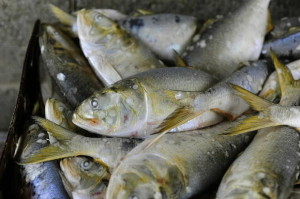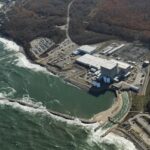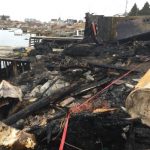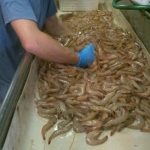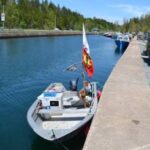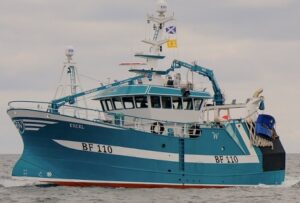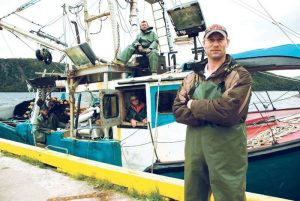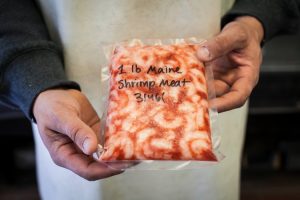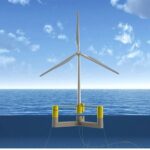Category Archives: North Pacific
NOAA starts review process to list Alaska Chinooks as threatened or endangered
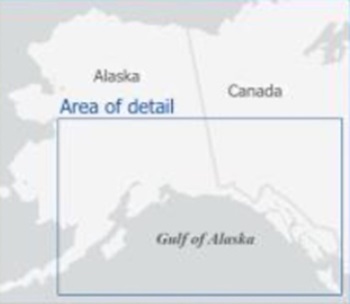 NOAA Fisheries on Thursday announced a 90-day finding on a petition to list Gulf of Alaska Chinook salmon “or any evolutionarily significant unit that may exist in the petitioned area, as a threatened or endangered species under the Endangered Species Act and to designate critical habitat concurrent with the listing.” The listing proposal comes after pressure from the Wild Fish Conservancy in Seattle, which filed a petition in January calling for federal protection of Alaska Chinook. “For decades, scientists have been sounding the alarm that Alaska’s Chinook are in dire trouble,” said Emma Helverson, executive director of the Wild Fish Conservancy. “Despite existing management plans and years of efforts by the state of Alaska, Chinook salmon continue to decline in abundance, size, diversity, and spatial structure throughout the state. Through this action, we are asking the federal government to undertake a formal status review and implement protections warranted under the Endangered Species Act, including designating critical habitat protections, to ensure the survival of these iconic fish.” more, >>CLICK TO READ<< 12:33
NOAA Fisheries on Thursday announced a 90-day finding on a petition to list Gulf of Alaska Chinook salmon “or any evolutionarily significant unit that may exist in the petitioned area, as a threatened or endangered species under the Endangered Species Act and to designate critical habitat concurrent with the listing.” The listing proposal comes after pressure from the Wild Fish Conservancy in Seattle, which filed a petition in January calling for federal protection of Alaska Chinook. “For decades, scientists have been sounding the alarm that Alaska’s Chinook are in dire trouble,” said Emma Helverson, executive director of the Wild Fish Conservancy. “Despite existing management plans and years of efforts by the state of Alaska, Chinook salmon continue to decline in abundance, size, diversity, and spatial structure throughout the state. Through this action, we are asking the federal government to undertake a formal status review and implement protections warranted under the Endangered Species Act, including designating critical habitat protections, to ensure the survival of these iconic fish.” more, >>CLICK TO READ<< 12:33
A Historic Agreement – Canada and U.S. suspend all fishing for Canadian-origin Yukon River chinook salmon
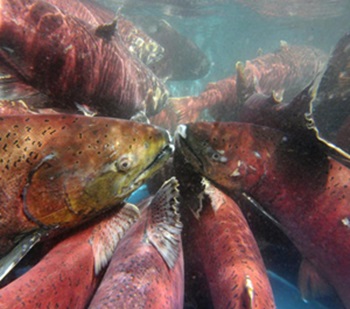 Canada and the United States are suspending all fishing for Canadian-origin Yukon River chinook salmon for seven years in an attempt to protect the dwindling species. The agreement covers the length of one life cycle of the fish and recognizes that the “persistent decline of chinook salmon” has led to an inability to meet conservation objectives in both countries. more, >>CLICK TO READ<< – Canada and Alaska sign a historic agreement to protect Yukon River Chinook salmon, To ensure the protection and recovery of Yukon River Chinook salmon, Fisheries and Oceans Canada and the Alaska Department of Fish and Game have signed a historic seven-year agreement. more, >>Click to read<< 10:33
Canada and the United States are suspending all fishing for Canadian-origin Yukon River chinook salmon for seven years in an attempt to protect the dwindling species. The agreement covers the length of one life cycle of the fish and recognizes that the “persistent decline of chinook salmon” has led to an inability to meet conservation objectives in both countries. more, >>CLICK TO READ<< – Canada and Alaska sign a historic agreement to protect Yukon River Chinook salmon, To ensure the protection and recovery of Yukon River Chinook salmon, Fisheries and Oceans Canada and the Alaska Department of Fish and Game have signed a historic seven-year agreement. more, >>Click to read<< 10:33
Alaska’s declining crab population due to trawlers catches attention of lawmaker
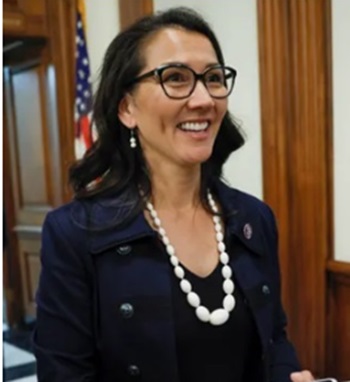 Alaska Rep. Mary Peltola’s mounting frustration with the largely Seattle-based pollock industry’s decades-old issue of inadvertently damaging the state’s rapidly declining crab populations and critical habitat for many other species may result in legislation a move heralded by the scientific and conservation communities. Members of the scientific community concerned with sustainability and conservation are currently in a deadlock with industrial pollock trawler fleets and the North Pacific Fishery Management Council over federal fishery regulations, including pelagic, or “mid-water” trawling, which uses wide-mouthed nets designed to target schools of Bering Sea Alaskan pollock. The Alaska Marine Conservation Council released a report in February 2023 analyzing the trawlers’ impact on red king crab habitats following the 2022 closure of the Alaska snow crab fisheries, which is still ongoing, and a two-year closure for Bristol Bay king crab that ended in 2023, underscoring the devastating environmental and financial toll. more, >>CLICK TO READ<< 19:17
Alaska Rep. Mary Peltola’s mounting frustration with the largely Seattle-based pollock industry’s decades-old issue of inadvertently damaging the state’s rapidly declining crab populations and critical habitat for many other species may result in legislation a move heralded by the scientific and conservation communities. Members of the scientific community concerned with sustainability and conservation are currently in a deadlock with industrial pollock trawler fleets and the North Pacific Fishery Management Council over federal fishery regulations, including pelagic, or “mid-water” trawling, which uses wide-mouthed nets designed to target schools of Bering Sea Alaskan pollock. The Alaska Marine Conservation Council released a report in February 2023 analyzing the trawlers’ impact on red king crab habitats following the 2022 closure of the Alaska snow crab fisheries, which is still ongoing, and a two-year closure for Bristol Bay king crab that ended in 2023, underscoring the devastating environmental and financial toll. more, >>CLICK TO READ<< 19:17
Alaska Legislature approves seafood task force for sector in ‘crisis’
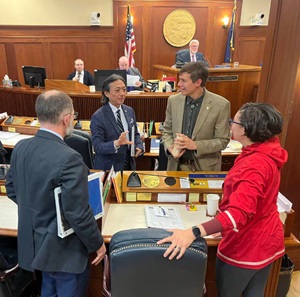 The Alaska Legislature on Sunday approved creating a task force to make policy recommendations to help the beleaguered commercial fishing industry. The task force is modeled be off another legislative task force created more than 20 years ago to help the salmon industry. At the time, salmon fishermen were struggling with the impacts of low prices and competition with farmed salmon. Alaska’s commercial fishing sector has recently struggled with low prices, a global market swamped with low-priced Russian seafood, and the closure of several seafood processing plants. Salmon returns have crashed in critical fisheries across Alaska. The United Fishermen of Alaska estimates that the state’s economy lost over $2 billion in 2023 alone as a result of the commercial fishing sector’s struggles. more, >>CLICK TO READ<< 08:00
The Alaska Legislature on Sunday approved creating a task force to make policy recommendations to help the beleaguered commercial fishing industry. The task force is modeled be off another legislative task force created more than 20 years ago to help the salmon industry. At the time, salmon fishermen were struggling with the impacts of low prices and competition with farmed salmon. Alaska’s commercial fishing sector has recently struggled with low prices, a global market swamped with low-priced Russian seafood, and the closure of several seafood processing plants. Salmon returns have crashed in critical fisheries across Alaska. The United Fishermen of Alaska estimates that the state’s economy lost over $2 billion in 2023 alone as a result of the commercial fishing sector’s struggles. more, >>CLICK TO READ<< 08:00
Deadliest Catch’ Season 20: Which Captains Will Return?
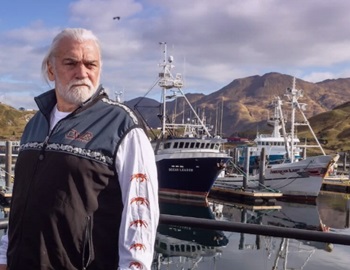 Deadliest Catch is back. In the landmark 20th season of the Discovery Channel reality series, the captains will encounter new opportunities and fresh challenges as they head out to sea for the first red king crab season in several years. Not only will crews be allowed to fish once more for the coveted red king crab, but this year, they’ll also participate in the first derby-style race in decades. That means even more intense competition than usual as both veteran and rookie captains fight to bring in the biggest hauls. At the same time, they’ll face unpredictable and dangerous weather patterns as a rare super El Niño weather pattern intensifies winter storms. Video, more, >>CLICK TO READ<< 12:51
Deadliest Catch is back. In the landmark 20th season of the Discovery Channel reality series, the captains will encounter new opportunities and fresh challenges as they head out to sea for the first red king crab season in several years. Not only will crews be allowed to fish once more for the coveted red king crab, but this year, they’ll also participate in the first derby-style race in decades. That means even more intense competition than usual as both veteran and rookie captains fight to bring in the biggest hauls. At the same time, they’ll face unpredictable and dangerous weather patterns as a rare super El Niño weather pattern intensifies winter storms. Video, more, >>CLICK TO READ<< 12:51
Bill will allow higher insurance reimbursements for injured commercial fishermen
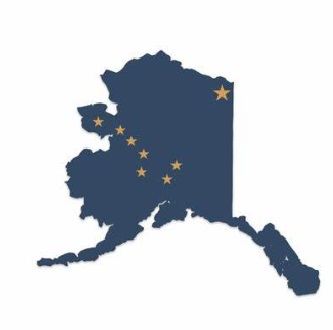 Injured commercial fishermen and boat owners in Alaska will now be able to access higher insurance reimbursements, thanks to Senate Bill 93, which was signed into law last month. The bill was sponsored by the Senate Labor and Commerce Committee, which Nikiski Republican Sen. Jesse Bjorkman chairs. It concerns the fishermen’s fund, which was established pre-statehood as a service to commercial fishermen who are injured while fishing. It’s funded by fees from commercial fishing licenses. “The Alaska fishermen’s fund reimburses licensed fishermen and boat owners for their out-of-pocket medical costs if they have been injured or have a qualified illness while fishing off-shore, or doing fishing-related work on-shore,” more, >>CLICK TO READ<< 13:00
Injured commercial fishermen and boat owners in Alaska will now be able to access higher insurance reimbursements, thanks to Senate Bill 93, which was signed into law last month. The bill was sponsored by the Senate Labor and Commerce Committee, which Nikiski Republican Sen. Jesse Bjorkman chairs. It concerns the fishermen’s fund, which was established pre-statehood as a service to commercial fishermen who are injured while fishing. It’s funded by fees from commercial fishing licenses. “The Alaska fishermen’s fund reimburses licensed fishermen and boat owners for their out-of-pocket medical costs if they have been injured or have a qualified illness while fishing off-shore, or doing fishing-related work on-shore,” more, >>CLICK TO READ<< 13:00
Anchoring the Family: The Life, Labor and Love of an Alaskan Fishing Mom
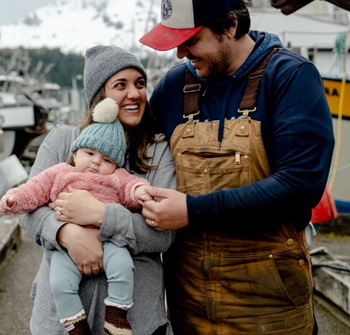 It’s called a labor of love for a reason. A life in fishing – especially in Alaska – can be equally rough and rewarding, spending days at sea where the wonders of the world take shape in glacial ridges and splashes of fish slipping over each other on deck. What you don’t always see is the effort, will, patience and passion of the people caring for those on the water from behind the shoreline. On the rugged coast of southern Alaska, where icy waters provide hope for a rich season, Kinsey Brown and her husband, Zeke, have woven their lives into the fabric of their small fishing community. It’s been said countless times by dedicated seafood harvesters across the globe that fishing is more than a livelihood. It’s a calling, community and a legacy that nearly all who fish hope to pass down to the newest generations of their fishing families. Video, photos, more, >>CLICK TO READ<< 10:30
It’s called a labor of love for a reason. A life in fishing – especially in Alaska – can be equally rough and rewarding, spending days at sea where the wonders of the world take shape in glacial ridges and splashes of fish slipping over each other on deck. What you don’t always see is the effort, will, patience and passion of the people caring for those on the water from behind the shoreline. On the rugged coast of southern Alaska, where icy waters provide hope for a rich season, Kinsey Brown and her husband, Zeke, have woven their lives into the fabric of their small fishing community. It’s been said countless times by dedicated seafood harvesters across the globe that fishing is more than a livelihood. It’s a calling, community and a legacy that nearly all who fish hope to pass down to the newest generations of their fishing families. Video, photos, more, >>CLICK TO READ<< 10:30
The number of fish on US overfishing list reaches an all-time low. Mackerel and snapper recover
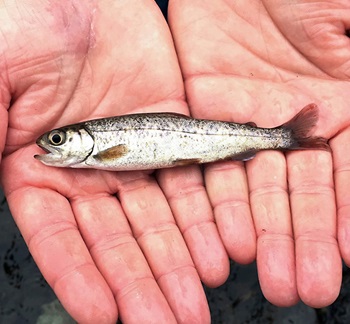 The National Oceanic and Atmospheric Administration released an updated analysis of American fisheries late last week via its annual “Status of the Stocks” report, which provides an assessment of the populations of the seafood species fishermen catch and customers buy. The report states that 94% of fish stocks are not subject to overfishing, which is slightly better than a year ago. The U.S. was able to remove several important fish stocks from the overfishing list, NOAA said in a statement. They include the Gulf of Maine and Cape Hatteras stock of Atlantic mackerel and the Gulf of Mexico stock of cubera snapper. more, >>CLICK TO READ<< 09:33
The National Oceanic and Atmospheric Administration released an updated analysis of American fisheries late last week via its annual “Status of the Stocks” report, which provides an assessment of the populations of the seafood species fishermen catch and customers buy. The report states that 94% of fish stocks are not subject to overfishing, which is slightly better than a year ago. The U.S. was able to remove several important fish stocks from the overfishing list, NOAA said in a statement. They include the Gulf of Maine and Cape Hatteras stock of Atlantic mackerel and the Gulf of Mexico stock of cubera snapper. more, >>CLICK TO READ<< 09:33
A Letter to Senator Elizabeth Warren
 I am Sam Parisi, a third-generation Gloucester fisherman. Recently U S Congressman Garret Graves, Senator Roger Wicker, and SenatorTed Cruz. to Modernize data used by NOAA and bring better science to the table. (Graves, Wicker Urge NOAA to Catch Better Data for Fisheries Management) We need to require NOAA to compare their science with other independent surveys and science. Our fishermen’s lives depend on how much fish is out there and we should be able to catch, without overfishing different species. We need to update the Magnuson–Stevens Fishery Conservation and Management Act that would require NOAA to compare before making restrictions. more, >>CLICK TO READ<< 11:58
I am Sam Parisi, a third-generation Gloucester fisherman. Recently U S Congressman Garret Graves, Senator Roger Wicker, and SenatorTed Cruz. to Modernize data used by NOAA and bring better science to the table. (Graves, Wicker Urge NOAA to Catch Better Data for Fisheries Management) We need to require NOAA to compare their science with other independent surveys and science. Our fishermen’s lives depend on how much fish is out there and we should be able to catch, without overfishing different species. We need to update the Magnuson–Stevens Fishery Conservation and Management Act that would require NOAA to compare before making restrictions. more, >>CLICK TO READ<< 11:58
Loved ones gather for reading of 264 names on Fishermen’s Memorial and the Blessing of the Fleet
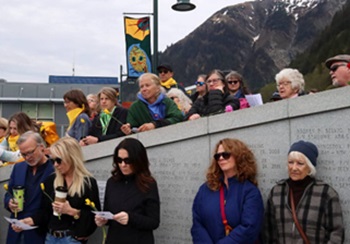 Brett Van Alen was a commercial seiner and troller in Southeast Alaska, as well as a fisher for squid and sardines in California, who died last December aboard a boat at the age of 38, according to his father Ben. On Saturday members of Brett’s extended family gathered at the Alaska Commercial Fishermen’s Memorial for an annual ceremony where his name was announced as one of the six that will be engraved into the memorial wall this summer. The reading of the 264 names on the wall, including those being engraved this year, to honor people lost at sea and others involved in the fishing industry occurred following the 34th annual Blessing of the Fleet at the downtown wharf. Photos, more, >>CLICK TO READ<< 07:46
Brett Van Alen was a commercial seiner and troller in Southeast Alaska, as well as a fisher for squid and sardines in California, who died last December aboard a boat at the age of 38, according to his father Ben. On Saturday members of Brett’s extended family gathered at the Alaska Commercial Fishermen’s Memorial for an annual ceremony where his name was announced as one of the six that will be engraved into the memorial wall this summer. The reading of the 264 names on the wall, including those being engraved this year, to honor people lost at sea and others involved in the fishing industry occurred following the 34th annual Blessing of the Fleet at the downtown wharf. Photos, more, >>CLICK TO READ<< 07:46
The federal government is assuming management of salmon fishing in parts of Alaska’s Cook Inlet
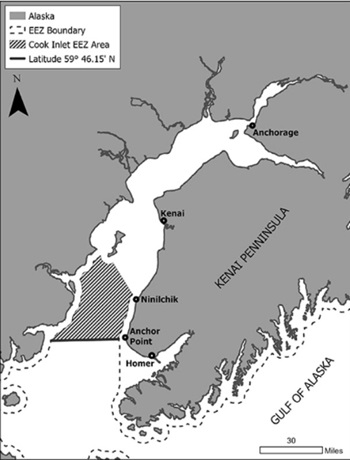 Commercial and recreational salmon fishing in the federal waters of Cook Inlet will resume this summer, but under new management by the federal government, according to a rule made final this week. Until now, the state had managed salmon fisheries in both state and federal waters of the inlet. But the switch in management was ordered by federal courts, as a result of litigation stretching back a decade. The United Cook Inlet Drift Association, or UCIDA, which is made up of commercial salmon fishers, sued the federal government in 2013 for failing to develop a salmon harvest management plan for the federal waters of the inlet. more, >>CLICK TO READ<< 13:11
Commercial and recreational salmon fishing in the federal waters of Cook Inlet will resume this summer, but under new management by the federal government, according to a rule made final this week. Until now, the state had managed salmon fisheries in both state and federal waters of the inlet. But the switch in management was ordered by federal courts, as a result of litigation stretching back a decade. The United Cook Inlet Drift Association, or UCIDA, which is made up of commercial salmon fishers, sued the federal government in 2013 for failing to develop a salmon harvest management plan for the federal waters of the inlet. more, >>CLICK TO READ<< 13:11
Alaska lawmakers, residents ask feds to limit how much salmon industrial trawlers catch
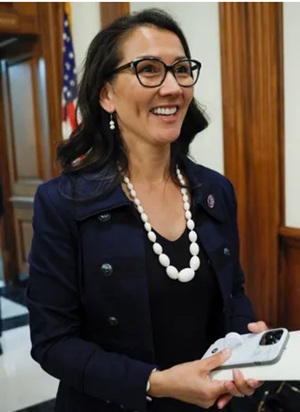 U.S. Rep. Mary Peltola, Alaskan Natives, and family-owned fisheries are looking for a sea change in the fishing rights battle between local fishermen and industrial trawling fishing operations after a federal council recently denied a tribe-approved reduction in chum salmon catches. In western Alaska, local communities are facing a significant decline in salmon populations. The cause of this decline remains a subject of intense debate between industry leaders, subsistence communities, conservation scientists, and local fishermen. Residents point to the Seattle-based trawler fleets in the Bering Sea fishing for pollock but unintentionally catching thousands of chum salmon as bycatch instead. more, >>CLICK TO READ<< 11:31
U.S. Rep. Mary Peltola, Alaskan Natives, and family-owned fisheries are looking for a sea change in the fishing rights battle between local fishermen and industrial trawling fishing operations after a federal council recently denied a tribe-approved reduction in chum salmon catches. In western Alaska, local communities are facing a significant decline in salmon populations. The cause of this decline remains a subject of intense debate between industry leaders, subsistence communities, conservation scientists, and local fishermen. Residents point to the Seattle-based trawler fleets in the Bering Sea fishing for pollock but unintentionally catching thousands of chum salmon as bycatch instead. more, >>CLICK TO READ<< 11:31
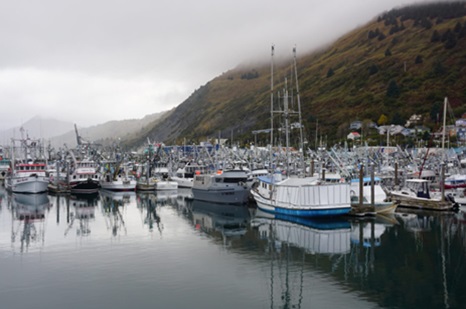
Report portrays mixed picture of Alaska’s huge seafood industry
The report from the McKinley Research Group, titled The Economic Value of Alaska’s Seafood Industry, is the latest in a periodic series commissioned by the Alaska Seafood Marketing Institute. The total economic value of the Alaska seafood industry in 2021 and 2022 was $6 billion, slightly more than the $5.6 billion tallied in 2019, the last full year prior to the COVID-19 pandemic, according to the new report and the previous version published in 2022. Along with that good news, the McKinley Research Group’s report contains a warning about the industry’s economic future. The seafood industry, between harvesters, processors and managers, accounted for 48,000 jobs on average in 2021 and 2022, equivalent to 29,100 full-time positions, the report said. That is a reduction from the 62,200 total jobs in 2019, the equivalent of 37,400 full-time positions. more, >>CLICK TO READ<< 11:21
Dockside Safety Exam Program – Coast Guard helps commercial fishermen ensure a safe catch
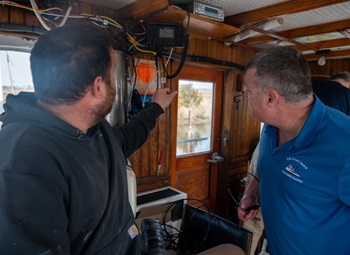 As the nation’s largest estuary, the Chesapeake Bay is a highly valued resource for more than 18 million people who live in its watershed. Producing about 500 million pounds of seafood each year, the Bay supports commercial and recreational fishing and creates one of the most economically significant regions of the Unites States. According to NOAA and the U.S. Bureau of Labor Statistics, commercial fishing is one of the country’s most dangerous occupations. “What we do for the local fishing community is support their workplace safety,” said Timothy Diehl, a Coast Guard vessel safety examiner from Sector Maryland-National Capital Region in Baltimore, Maryland. Most of Diehl’s workdays are spent traveling to area marinas where he meets with commercial fishing vessel operators and owners. Photos, more, >>CLICK TO READ<< 07:21
As the nation’s largest estuary, the Chesapeake Bay is a highly valued resource for more than 18 million people who live in its watershed. Producing about 500 million pounds of seafood each year, the Bay supports commercial and recreational fishing and creates one of the most economically significant regions of the Unites States. According to NOAA and the U.S. Bureau of Labor Statistics, commercial fishing is one of the country’s most dangerous occupations. “What we do for the local fishing community is support their workplace safety,” said Timothy Diehl, a Coast Guard vessel safety examiner from Sector Maryland-National Capital Region in Baltimore, Maryland. Most of Diehl’s workdays are spent traveling to area marinas where he meets with commercial fishing vessel operators and owners. Photos, more, >>CLICK TO READ<< 07:21
Commercial Fisherman Gainhart (Bud) Samuelson Junior, 77, of Petersburg has passed away
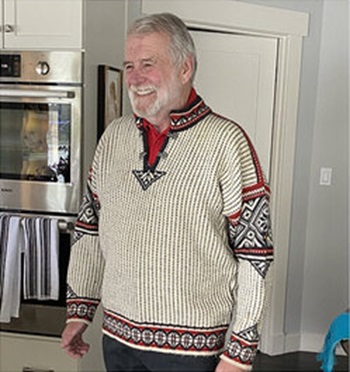 Bud was born on February 13, 1947, to Gainhart Samuelson, Senior, and Mildred (Massey) Samuelson. A lifelong resident of Petersburg, he grew up living with his mother and siblings on Hammer Slough. Summers were spent with his father at Portage Bay, where he loved fishing and hunting and grew determined to one day run a commercial fishing vessel of his own and to be a good provider for his family. After graduating from Petersburg High School in 1965, Bud landed a job on Andy Wikan’s boat, crabbing, longlining and seining aboard the wooden fishing vessel Pacific Sea. Before long, his dream future began to clarify around the captain’s lovely daughter, Audrey Wikan. Determined to impress, Bud’s fishing career accelerated until he was crabbing, seining, tendering and longlining throughout Southeast Alaska, the Gulf of Alaska, and the Bering Sea. more, >>CLICK TO READ<< 20:23
Bud was born on February 13, 1947, to Gainhart Samuelson, Senior, and Mildred (Massey) Samuelson. A lifelong resident of Petersburg, he grew up living with his mother and siblings on Hammer Slough. Summers were spent with his father at Portage Bay, where he loved fishing and hunting and grew determined to one day run a commercial fishing vessel of his own and to be a good provider for his family. After graduating from Petersburg High School in 1965, Bud landed a job on Andy Wikan’s boat, crabbing, longlining and seining aboard the wooden fishing vessel Pacific Sea. Before long, his dream future began to clarify around the captain’s lovely daughter, Audrey Wikan. Determined to impress, Bud’s fishing career accelerated until he was crabbing, seining, tendering and longlining throughout Southeast Alaska, the Gulf of Alaska, and the Bering Sea. more, >>CLICK TO READ<< 20:23
Graves, Wicker Urge NOAA to Catch Better Data for Fisheries Management
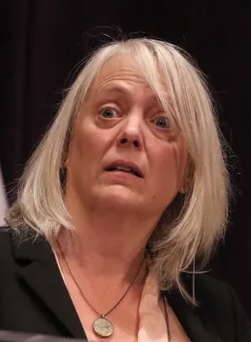 U.S. Congressman Garret Graves and U.S. Senator Roger Wicker – along with U.S. Senate Commerce Committee Ranking Member Ted Cruz (Texas), U.S. House Natural Resources Committee Chair Bruce Westerman and 20 other bipartisan Members of Congress – urged the National Oceanic and Atmospheric Administration (NOAA) Assistant Administrator Janet Coit to modernize the data used by the National Marine Fisheries Service (NMFS) and bring better science to the table for fisheries management. “Historically, the federal government’s fisheries data management has been a failure. Their system overestimates what has been caught, which gives us less opportunity to fish. There are real solutions on the table to reverse this trend .“We know that there’s better and more precise fisheries management data being collected by the states than what the federal government can provide, and we want NMFS to use the best data and science,” said Congressman Graves. “Our children and grandchildren deserve sound science and sustainable fisheries management. more, >>CLICK TO READ<< 09:23
U.S. Congressman Garret Graves and U.S. Senator Roger Wicker – along with U.S. Senate Commerce Committee Ranking Member Ted Cruz (Texas), U.S. House Natural Resources Committee Chair Bruce Westerman and 20 other bipartisan Members of Congress – urged the National Oceanic and Atmospheric Administration (NOAA) Assistant Administrator Janet Coit to modernize the data used by the National Marine Fisheries Service (NMFS) and bring better science to the table for fisheries management. “Historically, the federal government’s fisheries data management has been a failure. Their system overestimates what has been caught, which gives us less opportunity to fish. There are real solutions on the table to reverse this trend .“We know that there’s better and more precise fisheries management data being collected by the states than what the federal government can provide, and we want NMFS to use the best data and science,” said Congressman Graves. “Our children and grandchildren deserve sound science and sustainable fisheries management. more, >>CLICK TO READ<< 09:23
Owner, captains of crab fishing vessels charged with illegally transporting crab from Alaska
 A federal grand jury in Alaska returned an indictment charging the owner and captains of two crab catcher vessels with illegally transporting crab from Alaska, in violation of the Lacey Act. According to court documents, Corey Potter is the owner of the two crab catching vessels, and Corey Potter and Kyle Potter are the captains of the vessels. In February and March 2024, the vessels harvested over 7,000 pounds of Tanner and golden king crab in Southeast Alaska. Corey Potter allegedly directed Kyle Potter and Justin Welch to take the crab to Seattle, Washington, where they intended to sell it at a higher price than they would have in Alaska. more, >>CLICK TO READ<< 06:14
A federal grand jury in Alaska returned an indictment charging the owner and captains of two crab catcher vessels with illegally transporting crab from Alaska, in violation of the Lacey Act. According to court documents, Corey Potter is the owner of the two crab catching vessels, and Corey Potter and Kyle Potter are the captains of the vessels. In February and March 2024, the vessels harvested over 7,000 pounds of Tanner and golden king crab in Southeast Alaska. Corey Potter allegedly directed Kyle Potter and Justin Welch to take the crab to Seattle, Washington, where they intended to sell it at a higher price than they would have in Alaska. more, >>CLICK TO READ<< 06:14
Alaska Senate proposes $7.5M aid package for struggling fish processors
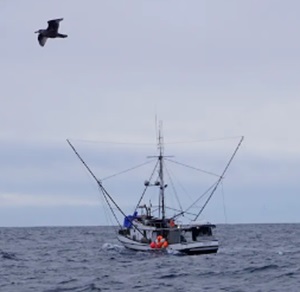 The Alaska Senate has proposed a new aid package for the state’s fish processing companies — some of which have been teetering among a crash in prices that’s caused an industry-wide crisis. The Senate, in its capital budget passed last week, included the $7.5 million grant to a nonprofit organization called SeaShare. Most of the cash would go toward buying out what SeaShare calls an “oversupply” of seafood from last year’s harvest, which it says is costing processing companies money to store in freezers. The program would add to more than $100 million in salmon and Alaska pollock purchases, more than 1,500 truck loads announced earlier this year by the U.S. Department of Agriculture. more, >>CLICK TO READ<< 14:46
The Alaska Senate has proposed a new aid package for the state’s fish processing companies — some of which have been teetering among a crash in prices that’s caused an industry-wide crisis. The Senate, in its capital budget passed last week, included the $7.5 million grant to a nonprofit organization called SeaShare. Most of the cash would go toward buying out what SeaShare calls an “oversupply” of seafood from last year’s harvest, which it says is costing processing companies money to store in freezers. The program would add to more than $100 million in salmon and Alaska pollock purchases, more than 1,500 truck loads announced earlier this year by the U.S. Department of Agriculture. more, >>CLICK TO READ<< 14:46
NOAA Fisheries Denies Request for Emergency Action on Bering Sea Chinook Salmon Bycatch
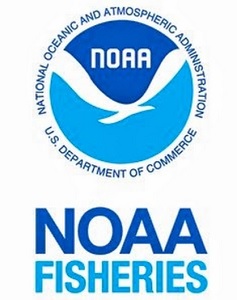 NOAA Fisheries denied a request for emergency action to institute a cap of zero on Chinook salmon bycatch in the Bering Sea pollock fishery. The request was submitted on January 17, 2024. It effectively asked Secretary of Commerce Gina Raimondo to close the Bering Sea pollock fishery, which opened on January 20, 2024. It was submitted by: Association of Village Council Presidents, Kuskokwim River Inter-Tribal Fish Commission, Tanana Chiefs Conference, Yukon River Drainage Fisheries Association, Yukon River Inter-Tribal Fish Commission. The petition also requested that the Department of Commerce urge the North Pacific Fishery Management Council to evaluate and update current Chinook salmon bycatch management. more, >>CLICK TO READ<< 13:08
NOAA Fisheries denied a request for emergency action to institute a cap of zero on Chinook salmon bycatch in the Bering Sea pollock fishery. The request was submitted on January 17, 2024. It effectively asked Secretary of Commerce Gina Raimondo to close the Bering Sea pollock fishery, which opened on January 20, 2024. It was submitted by: Association of Village Council Presidents, Kuskokwim River Inter-Tribal Fish Commission, Tanana Chiefs Conference, Yukon River Drainage Fisheries Association, Yukon River Inter-Tribal Fish Commission. The petition also requested that the Department of Commerce urge the North Pacific Fishery Management Council to evaluate and update current Chinook salmon bycatch management. more, >>CLICK TO READ<< 13:08
Alaska delusions – The great takeover of federal waters
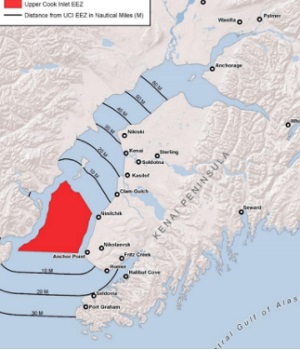 Oh if only the facts were as a trio of Alaska House legislators would like their colleagues to believe. They’ve drafted a resolution calling on Congress to extend state waters to 15 miles off the coast of Alaska because this would serve the state’s interest in supporting a “seafood industry generat(ing) over $163,000,000 in revenue for state and local governments.” All those zeros make that look like a great deal of money, but in terms of state revenue, $163 million is chicken feed. The state’s now fading oil industry is forecast to produce $3 billion in fiscal year 2024 or almost 20 times more, according to state projections. Worse though, the claim to $163 million in state revenue from the fishing industry comes from a report compiled for the Alaska Seafood Marketing Institute (ASMI) that is badly outdated, and the resolution now based on that report lacks the context which even the seafood sales promotion organization felt compelled to add. more, >>CLICK TO READ<< 08:56
Oh if only the facts were as a trio of Alaska House legislators would like their colleagues to believe. They’ve drafted a resolution calling on Congress to extend state waters to 15 miles off the coast of Alaska because this would serve the state’s interest in supporting a “seafood industry generat(ing) over $163,000,000 in revenue for state and local governments.” All those zeros make that look like a great deal of money, but in terms of state revenue, $163 million is chicken feed. The state’s now fading oil industry is forecast to produce $3 billion in fiscal year 2024 or almost 20 times more, according to state projections. Worse though, the claim to $163 million in state revenue from the fishing industry comes from a report compiled for the Alaska Seafood Marketing Institute (ASMI) that is badly outdated, and the resolution now based on that report lacks the context which even the seafood sales promotion organization felt compelled to add. more, >>CLICK TO READ<< 08:56
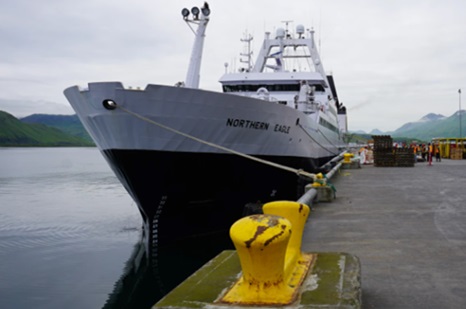
Fishery council seeks more information before deciding on chum bycatch in Bering Sea pollock fishery
The North Pacific Fishery Management Council, which manages federal fisheries in Alaska, will continue to explore options for how to manage chum salmon bycatch in the Bering Sea pollock fishery. The council, facing rising pressure from western Alaska communities who depend on chum as a cornerstone of subsistence, released a statement Wednesday summarizing their decision from their April meeting. Dismal western Alaska salmon returns have reached crisis levels. And while the council listened to scores of harrowing testimonies recalling empty rivers and vacant fish camps, the council was also presented with research that suggested bycatch limits wouldn’t do much to help the crisis. “Available science indicates recent declines in chum salmon populations across many regions of the North Pacific, including Canada, Japan, Russia, Korea, and the U.S., appear to be driven by warmer water temperatures in both the marine and freshwater environments,” the council said in the statement. more, >>click to read<< 12:38
Yukon River Panel hears fishing moratorium on Yukon River chinook may be ‘too little, too late’
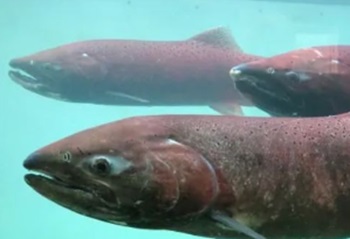 A new international agreement on chinook salmon stoked at times emotional debate at the Yukon River Panel meeting in Anchorage, Alaska, this week, and while many appeared to approve of the pact, others seemed to cast doubts. Duane Aucoin, a member of the Teslin Tlingit Council in the Yukon, said it’s taken the collapse of the chinook population to finally do something, but the natural world doesn’t work that way. “One thing we’re afraid of is, is this too little, too late?” he said. “Western policies, Western politics, Western science is what helped get us into this crisis, into this mess. Traditional knowledge will help get us out.” Photos, more, >>click to read<< 08:02
A new international agreement on chinook salmon stoked at times emotional debate at the Yukon River Panel meeting in Anchorage, Alaska, this week, and while many appeared to approve of the pact, others seemed to cast doubts. Duane Aucoin, a member of the Teslin Tlingit Council in the Yukon, said it’s taken the collapse of the chinook population to finally do something, but the natural world doesn’t work that way. “One thing we’re afraid of is, is this too little, too late?” he said. “Western policies, Western politics, Western science is what helped get us into this crisis, into this mess. Traditional knowledge will help get us out.” Photos, more, >>click to read<< 08:02
Athearn Marine Agency Boat of the Week: 141′ RSW Steel Stern Trawler, 1650HP CAT
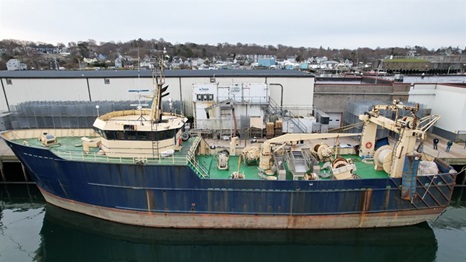 To review specifications, information, and 43 photos’, Video, >click here<, To see all the boats in this series, >click here< 07:33
To review specifications, information, and 43 photos’, Video, >click here<, To see all the boats in this series, >click here< 07:33
Silver Bay Seafoods and Peter Pan Seafoods Announce Valdez Acquisition and 2024 Operational Plan
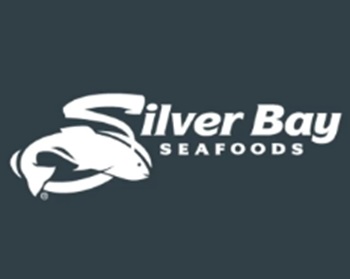 Silver Bay Seafoods and Peter Pan Seafoods announced today that the agreement for Silver Bay to acquire Peter Pan’s Valdez facility has been finalized and that Silver Bay plans to operate the Peter Pan facilities in Port Moller and Dillingham for the 2024 salmon season. Shifting operations of the two facilities to SBS is a component of a larger restructuring, still being finalized, in which Silver Bay would acquire Peter Pan’s processing facilities and support sites after the 2024 salmon season. Peter Pan will remain active in conducting the remaining activities needed to close out 2023 operations, including sales and accounting functions. Both companies are committed to a seamless transition and ensuring minimal disruption to fishermen, communities, and employees. more, >>click to read<< 10:21
Silver Bay Seafoods and Peter Pan Seafoods announced today that the agreement for Silver Bay to acquire Peter Pan’s Valdez facility has been finalized and that Silver Bay plans to operate the Peter Pan facilities in Port Moller and Dillingham for the 2024 salmon season. Shifting operations of the two facilities to SBS is a component of a larger restructuring, still being finalized, in which Silver Bay would acquire Peter Pan’s processing facilities and support sites after the 2024 salmon season. Peter Pan will remain active in conducting the remaining activities needed to close out 2023 operations, including sales and accounting functions. Both companies are committed to a seamless transition and ensuring minimal disruption to fishermen, communities, and employees. more, >>click to read<< 10:21
Western Alaska tribes, outraged by bycatch, turn up the heat on fishery managers and trawlers
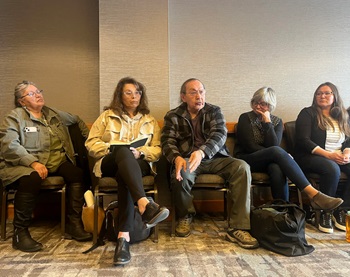 Earlier this spring, Maurice McGinty, a tribal leader from the village of Nulato, pulled out his last mason jar of smoked Yukon king. “We have no more now,” said McGinty, 80. He added: “They are pushing us, and our traditional way of life, into a hole.” Imagine hearing and reading versions of McGinty’s story dozens of times, told by Indigenous people who live along the Yukon and another iconic subsistence river in Southwest Alaska, the Kuskokwim. That’s the reality this week for the policymakers on the North Pacific Fishery Management Council, the federal commission that regulates commercial fishing in the American waters of the Bering Sea. On one side are tribal leaders from the Yukon and Kuskokwim, On the other side are representatives for the trawlers, more, >>click to read<< 13:51
Earlier this spring, Maurice McGinty, a tribal leader from the village of Nulato, pulled out his last mason jar of smoked Yukon king. “We have no more now,” said McGinty, 80. He added: “They are pushing us, and our traditional way of life, into a hole.” Imagine hearing and reading versions of McGinty’s story dozens of times, told by Indigenous people who live along the Yukon and another iconic subsistence river in Southwest Alaska, the Kuskokwim. That’s the reality this week for the policymakers on the North Pacific Fishery Management Council, the federal commission that regulates commercial fishing in the American waters of the Bering Sea. On one side are tribal leaders from the Yukon and Kuskokwim, On the other side are representatives for the trawlers, more, >>click to read<< 13:51
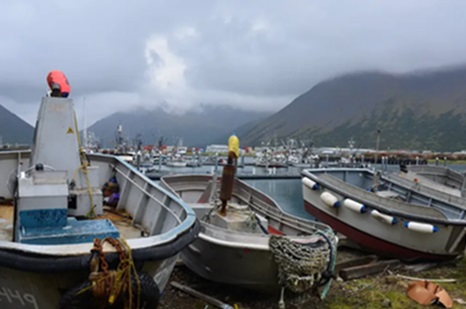
Alaska fishermen and processing plants are in limbo as a state-backed seafood company teeters
The fishing fleet in the Southwest Alaska town of King Cove would have been harvesting Pacific cod this winter. But they couldn’t: Skippers had nowhere to sell their catch. The enormous plant that usually buys and processes their fish never opened for the winter season. The company that runs the plant, Peter Pan Seafoods, is facing six-figure legal claims from fishermen who say they haven’t been paid for catches they delivered months ago. King Cove’s city administrator says the company is behind on its utility payments. And now, residents fear the plant may stay closed through the summer salmon season, which would leave the village with just half of the revenue that normally funds its yearly budget. “We should be fishing right now,” said Ken Mack, a longtime King Cove fisherman. more, >>click to read<< 09:36
Alaska Legislature boosts allowable payments from fund that covers fishers’ crew medical costs
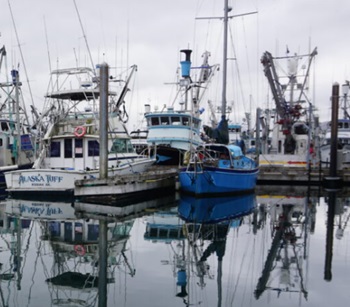 Maximum payouts from a fund that covers medical costs of injured seafood harvesters would be boosted under a bill that won final passage in the Alaska Legislature on Thursday. The measure, Senate Bill 93, would boost allowable payouts from the Fishermen’s Fund to $15,000 per injury or disablement from the current $10,000 maximum. The fund is financed directly by commercial fishers through their license and permit fees. The change in maximum payouts under the fund would incur no new cost to the Alaska Department of Labor and Workforce Development, according to the fiscal notes submitted for lawmakers’ review. more, >>click to read<< 10:13
Maximum payouts from a fund that covers medical costs of injured seafood harvesters would be boosted under a bill that won final passage in the Alaska Legislature on Thursday. The measure, Senate Bill 93, would boost allowable payouts from the Fishermen’s Fund to $15,000 per injury or disablement from the current $10,000 maximum. The fund is financed directly by commercial fishers through their license and permit fees. The change in maximum payouts under the fund would incur no new cost to the Alaska Department of Labor and Workforce Development, according to the fiscal notes submitted for lawmakers’ review. more, >>click to read<< 10:13
Blessing of the fleet asks for good weather, safety, and courage for Chilkat Valley fishermen
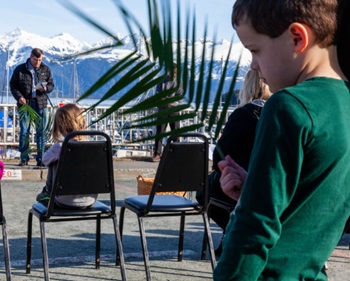 On a bluebird Sunday, a few dozen people gathered at the Small Boat Harbor for the Blessing of the Fleet. There was some confusion among people who attended about when exactly the tradition started in Haines – but many said the weather was the nicest it has been in years on the day of the ceremony. The annual gathering is sponsored by the Haines Ministerial Association and brings a multi-denominational crowd. “One of my favorite things about it,” said Haines Presbyterian Church Pastor Dana Perreard, “[is] you get folks who aren’t regular churchgoers because they want to honor their family members and remember them.” photos, more, >>click to read<< 07:09
On a bluebird Sunday, a few dozen people gathered at the Small Boat Harbor for the Blessing of the Fleet. There was some confusion among people who attended about when exactly the tradition started in Haines – but many said the weather was the nicest it has been in years on the day of the ceremony. The annual gathering is sponsored by the Haines Ministerial Association and brings a multi-denominational crowd. “One of my favorite things about it,” said Haines Presbyterian Church Pastor Dana Perreard, “[is] you get folks who aren’t regular churchgoers because they want to honor their family members and remember them.” photos, more, >>click to read<< 07:09






